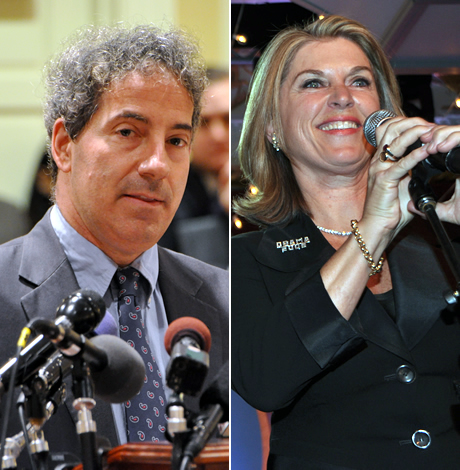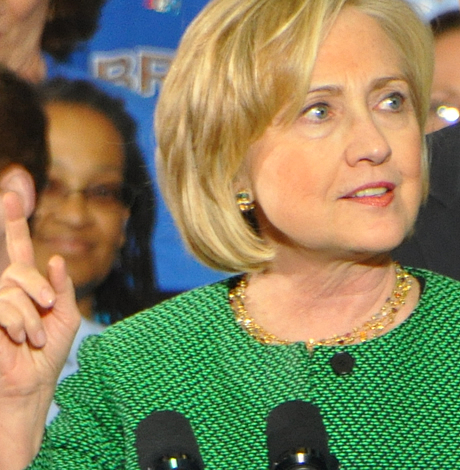National
Catholic Charities USA’s gay lobbyist
Sheridan Group paid nearly $500K for anti-poverty work

Catholic Charities USA, the nation’s largest network of faith-based agencies providing services to the poor, has hired a Washington lobbying firm owned by a gay man to promote a recently launched anti-poverty initiative before Congress and the Obama administration.
In a little noticed development, Catholic Charities USA retained the Sheridan Group, founded in 1991 by social worker and gay rights advocate Tom Sheridan, to coordinate the development of legislation and related advocacy programs aimed at “starting a new national conversation on poverty and opportunity.”
Lobbying disclosure reports filed with the House and Senate show that Catholic Charities USA paid the Sheridan Group $476,750 between April 2010 and April 2011 for lobbying services and advocacy work related to the Catholic organization’s anti-poverty projects.
News of the Sheridan Group’s lobbying work for Catholic Charities USA comes at a time when local Catholic Charities agencies — including those in D.C., Massachusetts, and Illinois — have withdrawn from providing adoption services for state or local governments rather than be forced to provide such services to same-sex couples.
Catholic Charities of the Archdiocese of Washington spoke out against a same-sex marriage law at the time the D.C. City Council deliberated over the measure.
Executive Director Edward Orzechowski announced shortly after the D.C. Council passed the same-sex marriage law in December 2009 that Catholic Charities of Washington would discontinue providing adoption services in D.C. rather than be forced to facilitate adoptions by gay and lesbian couples.
Orzechowski also announced that his organization would no longer offer health insurance benefits to the spouses of its employees to avoid having to offer such benefits to same-sex partners.
“This allows us to continue providing services, comply with the city’s new requirements and remain faithful to our church’s teachings,” he said at the time.
Sheridan points out that Catholic Charities USA, while serving as a trade association that represents as many as 165 local Catholic Charities agencies linked to the Catholic Church, is independent from the local agencies, including those that have voiced opposition to same-sex marriage.
“They’re only together as service providers on poverty issues, which is why I have no problem representing them,” Sheridan said of Catholic Charities USA. “And I’m proud to represent them because they do such outstanding work.”
Sheridan said he began his career as a social worker. As a gay Catholic interested in social justice causes, he said he has long admired the dedicated social services work Catholic Charities groups have performed throughout the country.
Prior to founding the Sheridan Group, Sheridan worked as a lobbyist in the early 1980s for the AIDS Action Council, one of the nation’s first national advocacy organizations for people with AIDS. In subsequent years, he said the Sheridan Group has represented a number of AIDS advocacy organizations as well as other non-profit, social justice oriented groups as clients.
Sister Jeannine Gramick, a Catholic nun and one of the founders of New Ways Ministry, which provides support for LGBT Catholics, said Catholic Charities USA and some local Catholic Charities agencies have provided behind-the-scenes support for the LGBT Catholic community.
“Catholic Charities in general have been the most progressive wing of the church other than the nuns,” she said. “In some cases, Catholic Charities USA has supported our events. I feel they personally are pro-gay but they can’t do this publicly.”
Francis DeBernardo, New Ways Ministry’s executive director, said Catholic Charities agencies on the local level shouldn’t be viewed as adversaries to the LGBT community.
“I feel the homophobia is there,” he said. “But that is due mostly to the bishops, who have an immense amount of power over Catholic Charities” on the local level.
When asked to comment on its decision to retain a lobbying firm owned by an openly gay man, Catholic Charities USA issued a written statement to the Blade from its president, Rev. Larry Snyder, a Roman Catholic priest.
Snyder said Catholic Charities USA has utilized the “strategic leadership of the Sheridan Group” to launch its centennial project that “incorporates policy development as well as legislative, communications, grassroots and fundraising efforts” to prevent and alleviate poverty over the next 100 years.
“We have been pleased with the success of this project to date and will continue to work with a bipartisan team of consultants on this campaign as we see our work grow in importance and urgency every day,” he said.
Among Sheridan and his firm’s key duties for Catholic Charities USA was the drafting of a bill called the National Opportunity and Community Renewal Act. Catholic Charities USA officials say they hope the bill, if approved by Congress, will serve as a catalyst for innovative new programs aimed at eradicating poverty in America in 10 years.
Sheridan said some of the money his firm received from Catholic Charities USA has gone to subcontractors that he hired in his role as “general contractor” on behalf of the anti-poverty initiative. The objective, he said, is to put together a bipartisan coalition of lawmakers and community leaders to sign on to the legislation.
Although the bill has not attracted much support in Congress so far, Sheridan said its introduction last year was linked to Catholic Charities USA’s 100th anniversary and the group’s special centennial celebration.
Sen. Bob Casey (D-Pa.) introduced the National Opportunity and Community Renewal Act in the Senate last year with no other senator signing on as a co-sponsor. Rep. James McGovern (D-Mass.) introduced the bill in the House, with just three co-sponsors signing on – all Democrats.
One congressional staffer, who spoke on condition of not being identified, said bills attracting so few co-sponsors usually have little or no chance of passing.
But Sheridan said he will be working closely with Catholic Charities USA and its allies and supporters over the next several months to build a broad-based, bipartisan coalition that he expects will prompt a sizable number of lawmakers to co-sponsor the bill.
Among other things, the bill would provide $100 million for 10 separate grants to fund anti-poverty demonstration projects on the state and local level.
Michigan
Mich. Democrats spar over LGBTQ-inclusive hate crimes law
Lawmakers disagree on just what kind of statute to pass

Michigan could soon become the latest state to pass an LGBTQ-inclusive hate crime law, but the state’s Democratic lawmakers disagree on just what kind of law they should pass.
Currently, Michigan’s Ethnic Intimidation Act only offers limited protections to victims of crime motivated by their “race, color, religion, gender, or national origin.” Bills proposed by Democratic lawmakers expand the list to include “actual or perceived race, color, religion, gender, sexual orientation, gender identity or expression, ethnicity, physical or mental disability, age, national origin, or association or affiliation with any such individuals.”
Democratic Gov. Gretchen Whitmer and Attorney General Dana Nessel have both advocated for a hate crime law, but house and senate Democrats have each passed different hate crimes packages, and Nessel has blasted both as being too weak.
Under the house proposal that passed last year (House Bill 4474), a first offense would be punishable with a $2,000 fine, up to two years in prison, or both. Penalties double for a second offense, and if a gun or other dangerous weapons is involved, the maximum penalty is six years in prison and a fine of $7,500.
But that proposal stalled when it reached the senate, after far-right news outlets and Fox News reported misinformation that the bill only protected LGBTQ people and would make misgendering a trans person a crime. State Rep. Noah Arbit, the bill’s sponsor, was also made the subject of a recall effort, which ultimately failed.
Arbit submitted a new version of the bill (House Bill 5288) that added sections clarifying that misgendering a person, “intentionally or unintentionally” is not a hate crime, although the latest version (House Bill 5400) of the bill omits this language.
That bill has since stalled in a house committee, in part because the Democrats lost their house majority last November, when two Democratic representatives resigned after being elected mayors. The Democrats regained their house majority last night by winning two special elections.
Meanwhile, the senate passed a different package of hate crime bills sponsored by state Sen. Sylvia Santana (Senate Bill 600) in March that includes much lighter sentences, as well as a clause ensuring that misgendering a person is not a hate crime.
Under the senate bill, if the first offense is only a threat, it would be a misdemeanor punishable by one year in prison and up to $1,000 fine. A subsequent offense or first violent hate crime, including stalking, would be a felony that attracts double the punishment.
Multiple calls and emails from the Washington Blade to both Arbit and Santana requesting comment on the bills for this story went unanswered.
The attorney general’s office sent a statement to the Blade supporting stronger hate crime legislation.
“As a career prosecutor, [Nessel] has seen firsthand how the state’s weak Ethnic Intimidation Act (not updated since the late 1980’s) does not allow for meaningful law enforcement and court intervention before threats become violent and deadly, nor does it consider significant bases for bias. It is our hope that the legislature will pass robust, much-needed updates to this statute,” the statement says.
But Nessel, who has herself been the victim of racially motivated threats, has also blasted all of the bills presented by Democrats as not going far enough.
“Two years is nothing … Why not just give them a parking ticket?” Nessel told Bridge Michigan.
Nessel blames a bizarre alliance far-right and far-left forces that have doomed tougher laws.
“You have this confluence of forces on the far right … this insistence that the First Amendment protects this language, or that the Second Amendment protects the ability to possess firearms under almost any and all circumstances,” Nessel said. “But then you also have the far left that argues basically no one should go to jail or prison for any offense ever.”
The legislature did manage to pass an “institutional desecration” law last year that penalizes hate-motivated vandalism to churches, schools, museums, and community centers, and is LGBTQ-inclusive.
According to data from the U.S. Department of Justice, reported hate crime incidents have been skyrocketing, with attacks motivated by sexual orientation surging by 70 percent from 2020 to 2022, the last year for which data is available.
Twenty-two states, D.C., Puerto Rico, and the U.S. Virgin Islands have passed LGBTQ-inclusive hate crime laws. Another 11 states have hate crime laws that include protections for “sexual orientation” but not “gender identity.”
Michigan Democrats have advanced several key LGBTQ rights priorities since they took unified control of the legislature in 2023. A long-stalled comprehensive anti-discrimination law was passed last year, as did a conversion therapy ban. Last month the legislature updated family law to make surrogacy easier for all couples, including same-sex couples.
A bill to ban the “gay panic” defense has passed the state house and was due for a Senate committee hearing on Wednesday.
Indiana
Drag queen announces run for mayor of Ind. city
Branden Blaettne seeking Fort Wayne’s top office

In a Facebook post Tuesday, a local drag personality announced he was running for the office of mayor once held by the late Fort Wayne Mayor Tom Henry, who died last month just a few months into his fifth term.
Henry was recently diagnosed with late-stage stomach cancer and experienced an emergency that landed him in hospice care. He died shortly after.
WPTA, a local television station, reported that Fort Wayne resident Branden Blaettne, whose drag name is Della Licious, confirmed he filed paperwork to be one of the candidates seeking to finish out the fifth term of the late mayor.
Blaettner, who is a community organizer, told WPTA he doesn’t want to “get Fort Wayne back on track,” but rather keep the momentum started by Henry going while giving a platform to the disenfranchised groups in the community. Blaettner said he doesn’t think his local fame as a drag queen will hold him back.
“It’s easy to have a platform when you wear platform heels,” Blaettner told WPTA. “The status quo has left a lot of people out in the cold — both figuratively and literally,” Blaettner added.

The Indiana Capital Chronicle reported that state Rep. Phil GiaQuinta, who has led the Indiana House Democratic caucus since 2018, has added his name to a growing list of Fort Wayne politicos who want to be the city’s next mayor. A caucus of precinct committee persons will choose the new mayor.
According to the Fort Wayne Journal Gazette, the deadline for residents to file candidacy was 10:30 a.m. on Wednesday. A town hall with the candidates is scheduled for 6 p.m. on Thursday at Franklin School Park. The caucus is set for 10:30 a.m. on April 20 at the Lincoln Financial Event Center at Parkview Field.
At least six candidates so far have announced they will run in the caucus. They include Branden Blaettne, GiaQuinta, City Councilwoman Michelle Chambers, City Councilwoman Sharon Tucker, former city- and county-council candidate Palermo Galindo, and 2023 Democratic primary mayoral candidate Jorge Fernandez.
Arizona
Ariz. governor vetoes anti-transgender, Ten Commandments bill
Katie Hobbs has pledged to reject anti-LGBTQ bills that reach her desk

BY CAITLIN SIEVERS | A slew of Republican bills, including those that would have allowed discrimination against transgender people and would have given public school teachers a green light to post the Ten Commandments in their classrooms, were vetoed by Gov. Katie Hobbs on Tuesday.
Hobbs, who has made it clear that she’ll use her veto power on any bills that don’t have bipartisan support — and especially ones that discriminate against the LGBTQ community — vetoed 13 bills, bringing her count for this year to 42.
Republicans responded with obvious outrage to Hobbs’s veto of their “Arizona Women’s Bill of Rights,” which would have eliminated any mention of gender in state law, replacing it with a strict and inflexible definition of biological sex. The bill would have called for the separation of sports teams, locker rooms, bathrooms, and even domestic violence shelters and sexual assault crisis centers by biological sex, not gender identity, green-lighting discrimination against trans Arizonans.
“As I have said time and again, I will not sign legislation that attacks Arizonans,” Hobbs wrote in a brief letter explaining why she vetoed Senate Bill 1628.
The Arizona Senate Republicans’ response to the veto was filled with discriminatory language about trans people and accused them of merely pretending to be a gender different than they were assigned at birth.
“With the radical Left attempting to force upon society the notion that science doesn’t matter, and biological males can be considered females if they ‘feel’ like they are, Katie Hobbs and Democrats at the Arizona State Legislature are showing their irresponsible disregard for the safety and well-being of women and girls in our state by killing the Arizona Women’s Bill of Rights,” Senate Republicans wrote in a statement.
The Senate Republicans went on to accuse the Democrats who voted against the bill of endangering women.
“Instead of helping these confused boys and men, Democrats are only fueling the dysfunction by pretending biological sex doesn’t matter,” Senate President Warren Petersen said in the statement. “Our daughters, granddaughters, nieces, and neighbors are growing up in a dangerous time where they are living with an increased risk of being victimized in public bathrooms, showers, and locker rooms because Democrats are now welcoming biological males into what used to be traditionally safe, single-sex spaces.”
But trans advocates say, and at least one study has found, that there’s no evidence allowing trans people to use the bathroom that aligns with their identity makes those spaces less safe for everyone else who uses them.
In the statement, the bill’s sponsor, Sen. Sine Kerr (R-Buckeye), claimed that the bill would have stopped trans girls from competing in girls sports, something she said gives them an unfair advantage. But Republicans already passed a law to do just that in 2022, when Republican Gov. Doug Ducey was still in office, though that law is not currently being enforced amidst a court challenge filed by two trans athletes.
Republicans also clapped back at Hobbs’ veto of Senate Bill 1151, which would have allowed teachers or administrators to teach or post the Ten Commandments in public school classrooms, a measure that some Republicans even questioned as possibly unconstitutional.
In a statement, the bill’s sponsor, Sen. Anthony Kern (R-Glendale), accused Hobbs of “abandoning God” with her veto.
“As society increasingly strays away from God and the moral principles our nation was founded upon, Katie Hobbs is contributing to the cultural degradation within Arizona by vetoing legislation today that would have allowed public schools to include the Ten Commandments in classrooms,” Kern said in the statement.
In her veto letter, Hobbs said she questioned the constitutionality of the bill, and also called it unnecessary. During discussion of the bill in March, several critics pointed out that posting the Ten Commandments in public school classrooms, tenets of Judeo-Christian religions, might make children whose families practice other religions feel uncomfortable.
“Sadly, Katie Hobbs’ veto is a prime example of Democrats’ efforts to push state-sponsored atheism while robbing Arizona’s children of the opportunity to flourish with a healthy moral compass,” Kern said.
Another Republican proposal on Hobbs’s veto list was Senate Bill 1097, which would have made school board candidates declare a party affiliation. School board races in Arizona are currently nonpartisan.
“This bill will further the politicization and polarization of Arizona’s school district governing boards whose focus should remain on making the best decisions for students,” Hobbs wrote in her veto letter. “Partisan politics do not belong in Arizona’s schools.”
******************************************************************************************

Caitlin joined the Arizona Mirror in 2022 with almost 10 years of experience as a reporter and editor, holding local government leaders accountable from newsrooms across the West and Midwest. She’s won statewide awards in Nebraska, Indiana and Wisconsin for reporting, photography and commentary.
******************************************************************************************
The preceding piece was previously published by the Arizona Mirror and is republished with permission.
Amplifying the voices of Arizonans whose stories are unheard; shining a light on the relationships between people, power and policy; and holding public officials to account.
Arizona Mirror is part of States Newsroom, the nation’s largest state-focused nonprofit news organization.
-

 Africa4 days ago
Africa4 days agoCongolese lawmaker introduces anti-homosexuality bill
-

 World4 days ago
World4 days agoOut in the World: LGBTQ news from Europe and Asia
-

 District of Columbia3 days ago
District of Columbia3 days agoReenactment of first gay rights picket at White House set for April 17
-

 Africa3 days ago
Africa3 days agoUgandan activists appeal ruling that upheld Anti-Homosexuality Act










